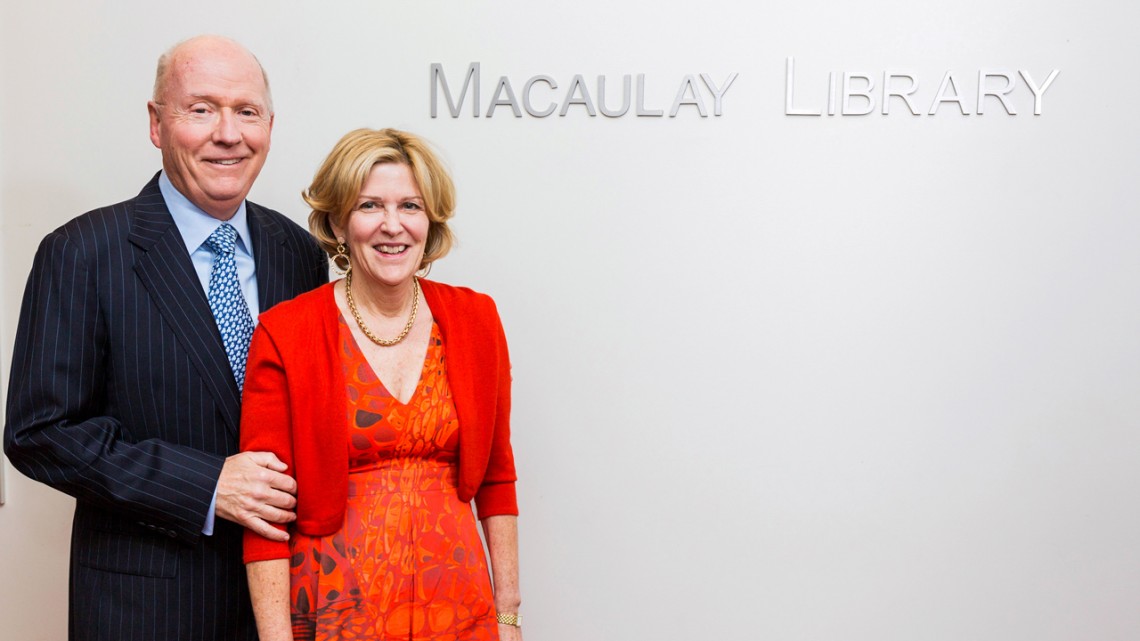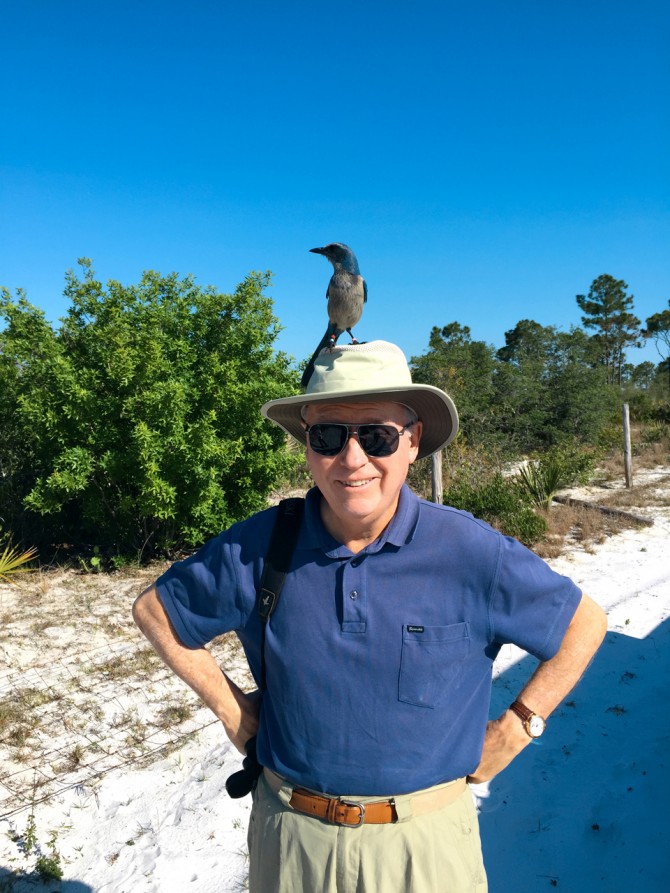
Bill and Linda Macaulay in front of the Macaulay Library at the Cornell Lab of Ornithology.
Bill Macaulay, Lab of Ornithology benefactor, dies at 74
By Miyoko Chu
William E. “Bill” Macaulay, longtime benefactor of the Cornell Lab of Ornithology and passionate supporter of higher education, died Nov. 26 at the age of 74.
The Linda R. and William E. Macaulay Library at the Lab of Ornithology, named after Bill and wife Linda, is the premier archive of media from the natural world, with more than 15 million photos, sound recordings and videos of wildlife, including 95% of the bird species on Earth.
“The exponential growth of the collection was made possible by Bill and Linda,” said Mike Webster, director of the Macaulay Library, “but the truly transformative effect of their support is that it’s become more than just a collection. It’s a global network, with more than 78,000 contributors uploading directly from field sites – and these assets are being used for research, education and outreach all around the world.”
Born Sept. 2, 1945 in New York City, Bill Macaulay received a bachelor’s degree in economics from the City University of New York (CUNY) and an MBA from the Wharton School of the University of Pennsylvania. CUNY named its William E. Macaulay Honors College after him in 2006.
As founder and chairman of First Reserve Corp., the first global private equity firm focused exclusively on energy, Bill Macaulay’s business took him and Linda across the world. That, plus Linda Macaulay’s passion for birds and her dedication to recording their sounds, was a fortuitous combination for the Lab of Ornithology.
The couple embarked on quests together to record birds in some of the wildest, most remote places on Earth. Through the decades, Linda Macaulay recorded more than 3,000 wildlife species, including 650 recordings that were the first for the species in the Macaulay Library archive. Her contributions are unsurpassed, with more than 6,000 recordings in the collection bearing her name, many of them captured as husband Bill lugged the equipment.
“Those are Linda’s recordings, but Bill was by her side for so much; they were a team. They both put a lot of sweat and toil into getting those recordings,” Webster said.
Today, those recordings are all freely available for anyone to hear at MacaulayLibrary.org, along with multimedia that is contributed daily by thousands across the globe. Anyone can upload photos and sounds of birds along with observational checklists submitted through the eBird citizen-science project.
The Macaulay Library not only houses these sounds and images as priceless, historic records of the diversity and behaviors of birds – it is shaping the future by collecting and distributing real-time, worldwide data that can be used in dynamic publications, wildlife-identification tools using computer vision, and cutting-edge research linking physical museum specimens with digital recordings of wildlife in sound and motion.
Steve Kelling, co-director of the Lab of Ornithology’s Center for Avian Population Studies, credits these advances to visionary leadership provided by both Bill and Linda Macaulay, the latter of whom has served as chair of the lab’s administrative board since 2016.
“Bill’s foresight in recognizing the technical advances we needed to make – and his willingness to support them – was huge.” Kelling said. “He was always inquisitive and grilled me on how to do things.”
Kelling points to Bill Macaulay’s encouragement in creating innovations that have taken advantage of new technological capabilities. For example, massive numbers of incoming photos are now used to train the Lab’s Merlin Bird ID app to identify birds. This app has been downloaded 3.4 million times, helping people identify birds on five continents. In 2020, the Lab will roll out a dynamic digital publication, “Birds of the World,” covering all bird species, with media from the Macaulay Library.
“Bill and Linda contributed generously to the growth and successes of the entire Cornell Lab of Ornithology over the past quarter century,” said John Fitzpatrick, the Lab’s director. “Throughout, the Lab has benefited from Bill’s intellectual curiosity and astute, business-savvy advice. Bill enjoyed watching us grow, embrace technology and keep evolving. All of us will miss Bill immensely, and our hearts are with the entire Macaulay family.”
In addition to Linda, Bill Macaulay is survived by two children and two grandchildren.
Miyoko Chu is senior director of communications for the Cornell Lab of Ornithology.
Media Contact
Get Cornell news delivered right to your inbox.
Subscribe

